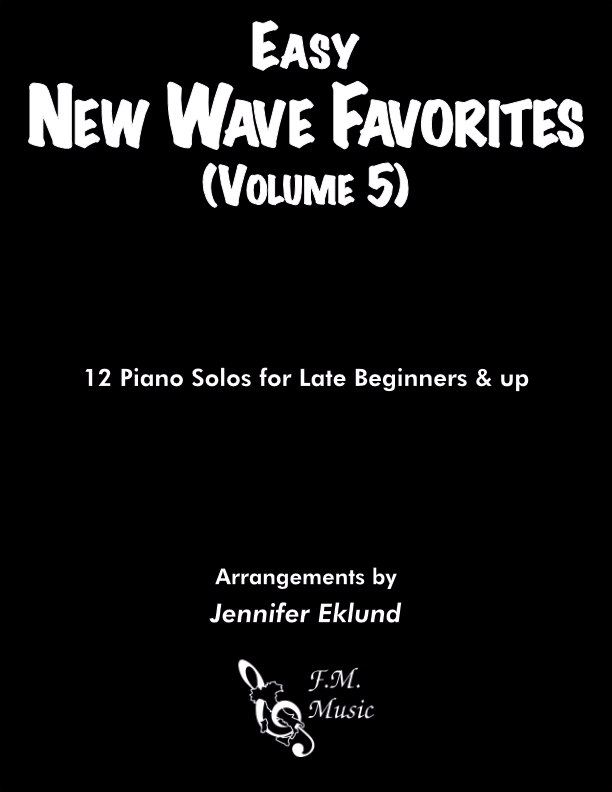🎹 What is New Wave music?
New Wave music spanned the late 1970s through the 1980s and emerged as a more melodic and light-hearted extension of punk culture. It embraced various pop-oriented styles and prominently featured the use of synthesizers. Initially a catch-all term for post-punk musical expressions, New Wave later evolved into a broader umbrella encompassing power pop, synth-pop, alternative dance, and milder forms of punk. It also can be perceived as a more accessible counterpart to post-punk.
Characterized by its distinctive attributes, New Wave music exhibited a playful and humorous pop sensibility, characterized by angular guitar riffs and unconventional rhythms, often enhanced by electronic elements, especially the use of synthesizers. A visually appealing fashion sense and distinctive music videos were crucial to the genre’s success. The movement’s roots lie in Britain, where British New Wave artists initially gained prominence and subsequently captured American audiences through platforms like MTV. The genre is sometimes referred to as the second British invasion.
New Wave’s initial peak occurred from the late 1970s to the early 1980s, supported by major musicians and a proliferation of one-hit wonders. MTV’s launch in 1981 played a pivotal role in amplifying the genre’s popularity by heavily featuring new wave acts. While New Wave experienced a decline in the mid-1980s due to the ascent of other genres, it has resurged intermittently since the 1990s, fueled by nostalgia for its influences. Additionally, new wave’s musical characteristics, including choppy rhythms, quirky pop sensibilities, and electronic incorporation, continue to have a lasting influence on subsequent generations of artists.
🎶 Easy New Wave Favorites: Volume 5 Songbook
The following songs are included in the Easy New Wave Favorites: Volume 5 songbook. These are all available as separate singles, but you get the most value by purchasing the whole collection. All of these arrangements are appropriate for late beginners and early intermediates.
- Bad Reputation (Joan Jett)
- Blue Monday (New Order)
- I Fought the Law (The Clash)
- If You Leave (OMD)
- Just What I Needed (The Cars)
- People Are People (Depeche Mode)
- Sheena Is a Punk Rocker (Ramones)
- Sunglasses at Night (Corey Hart)
- Take on Me (A-ha)
- The Killing Moon (Echo & The Bunnymen)
- We Got the Beat (The Go-Go’s)
- White Wedding (Billy Idol)
🎹 Watch a performance of the entire songbook:
⭐ Featured Favorites
There’s so many great videos from this era that it’s hard to narrow down the best ones, but these personal favorites from Easy New Wave Favorites: Volume 5! made the cut!
“Take On Me” (A-ha) (1985)
“Take On Me” is a well-known synth-pop song by the Norwegian band a-ha. Originally recorded in 1984, the track underwent multiple versions and remixes before achieving global success in 1985. The 1985 international hit version was produced by Alan Tarney and featured on their debut studio album “Hunting High and Low.” Blending synth-pop with a mix of acoustic guitars, keyboards, and drums, the song’s distinctive sound was characterized by Morten Harket’s emotive vocals and a memorable melody. The original release failed to chart significantly in the UK and the US, but the song gained immense popularity after the release of its groundbreaking music video.
The music video, directed by Steve Barron, employed innovative pencil-sketch animation mixed with live-action footage, a technique called rotoscoping. The video’s unique visual style captured widespread attention and received heavy rotation on MTV. This exposure, coupled with the remastered version of the song, led to its ultimate success, topping the Billboard Hot 100 in the US in October 1985 and reaching number two on the UK Singles Chart. The video won multiple awards at the 1986 MTV Video Music Awards and has since garnered billions of views on YouTube.
The song’s catchy melody, distinctive vocals, and iconic music video have made “Take On Me” a lasting pop culture phenomenon, showcasing the power of creative music visuals in propelling a song to international acclaim.
“Just What I Needed” (The Cars) (1978)
“Just What I Needed” is a notable rock song by the American band the Cars, featured on their 1978 self-titled debut album. The track, sung by bassist Benjamin Orr and written by Ric Ocasek, drew inspiration from the Ohio Express and the Velvet Underground. Originally released as a demo, the song gained radio success and was later officially released as a single.
The song’s distinctive sound blends new wave and power pop elements, with a prominent opening riff borrowed from “Yummy Yummy Yummy” by the Ohio Express. The keyboard riff performed by Greg Hawkes contributes to its unique composition. “Just What I Needed” was released as a single in 1978, reaching number 27 on the US Billboard Hot 100 and number 17 on the UK Singles Chart. The song’s popularity led to its inclusion in numerous compilation albums and soundtracks, and it has been covered by various artists.
Critics praised the song for its energetic pop-rock blend, with catchy guitar work and Benjamin Orr’s skillful vocals. Over the years, it has been recognized as one of the band’s signature tracks and is considered one of the best Cars songs. It was also featured on Rolling Stone’s list of the “500 Greatest Songs of All Time,” highlighting its impact on the rock music landscape.
Weezer frontman Rivers Cuomo singled out the song as the reason for selecting Ocasek to be the band’s producer for their debut album, recalling, “One day I was in the grocery store and I heard ‘Just What I Needed’. I was like, ‘Yeah that’s kind of what I want the Weezer record to sound like. So let’s get that guy.”
“The Killing Moon” (Echo & The Bunnymen) (1984)
Ethereally elegant. Will we ever have music like this again?
“The Killing Moon” is a song by the British post-punk band Echo & The Bunnymen, released in 1984 as a single from their album “Ocean Rain.” The song is often regarded as one of the band’s most iconic and critically acclaimed tracks. The song has garnered a devoted following and is frequently highlighted as a standout track from the 1980s. It showcases the band’s distinctive blend of post-punk and New Wave elements with a touch of atmospheric and ethereal soundscapes.
The song is characterized by its haunting and atmospheric quality. It features a prominent, echoing guitar riff and lush orchestration, creating a sense of grandeur and drama. Frontman Ian McCulloch’s distinctive and emotive vocals add to the song’s powerful impact. The lyrics of “The Killing Moon” are poetic and evocative, contributing to the song’s ethereal and mysterious ambiance.
The lyrics of “The Killing Moon” are open to interpretation, often associated with themes of fate, introspection, and transcendence. The imagery in the song conjures a sense of mystery and contemplation, with phrases like “Fate up against your will” and “Heaven smiles above me” contributing to the song’s enigmatic atmosphere. The title itself alludes to the moon’s symbolism of change and transformation.
“The Killing Moon” has left a lasting mark on music history and pop culture. Its inclusion in various films, TV shows, and commercials has introduced the song to new generations. Additionally, the song’s distinct sound and emotional depth have influenced subsequent artists and bands, contributing to its enduring legacy.
“Sunglasses at Night” (Corey Hart) (1984)
I mean, when else should you wear your sunglasses?
“Sunglasses at Night” is a song by Canadian artist Corey Hart, released in 1984 as the first single from his debut album “First Offense.” The song is one of Hart’s most recognizable and enduring hits, known for its catchy melody, synth-driven sound, and distinctive lyrical theme. “Sunglasses at Night” was a commercial success for Corey Hart, becoming a breakthrough hit for him. The song reached the top of the charts in Canada and the United States, as well as achieving significant chart positions in other countries. Its popularity helped propel Corey Hart to international fame.
The song features a synth-heavy sound that was characteristic of the 1980s pop and new wave music. It opens with a recognizable electronic bassline, setting the tone for the rest of the track. Hart’s vocals are delivered with a mix of intensity and vulnerability, giving the song its distinctive emotional quality. The use of synthesizers and electronic production elements adds to the song’s overall atmospheric and slightly dark ambiance.
“Sunglasses at Night” became a cultural touchstone of the 1980s and is often associated with the era’s pop music and fashion trends. The song’s music video, featuring Hart wearing his iconic sunglasses, further solidified its impact. The video received regular airplay on MTV, helping to boost its popularity and solidify its status as a classic of the decade.
“If You Leave” (O.M.D.) (1986)
It’s like high school, all over again (is that a good thing??)
“If You Leave” is a 1986 song by English electronic band Orchestral Manoeuvres in the Dark (O.M.D), famously featured in the film “Pretty in Pink.” Initially intended as an ending track for the movie, the song replaced another due to director John Hughes’ preference for a different emotional tone. The song captures the sentiment of leaving behind high school and childhood, encapsulating the fear and uncertainty of what lies ahead. Written and recorded in under 24 hours to match the desired tempo of the film’s ending scene, “If You Leave” became O.M.D.’s most iconic song. Praised for its synthesizer melody and described as a defining track of the 1980s, the song achieved critical acclaim despite some mixed reception at its release.
“If You Leave” achieved its peak success on the U.S. Billboard Hot 100, securing the group’s highest chart position by reaching number 4 in May of 1986. The song mirrored this accomplishment in other countries, entering the Top 5 in Canada and New Zealand, while in Australia, it secured a spot at number 15. Reverberating with the essence of the 1980s, it garnered praise from Interview magazine as a song of unparalleled influence, encapsulating the spirit of the era like few others in its genre.



 - MN/images/Cover--TakeOnMe-Easy-MN.png)
 - MN/images/Cover--TakeOnMe-Int-MN.png)
 - Easy/images/Cover--justwhatineeded-EZ-MN.png)
 - Intermediate/images/Cover--justwhatineeded-INT-MN.png)
 - Easy/images/Cover--killingmoon-EZ-MN.png)
 - Intermediate/images/Cover--killingmoon-INT-MN.png)
 - Easy/images/Cover--sunglasses-EZ-MN.png)
 - Intermediate/images/Cover--sunglasses-INT-FULL-MN.png)
 - Advanced/images/Cover--sunglasses-ADV-MN.png)
 - Easy/images/Cover--ifyouleave-EZ-MN.png)
 - Intermediate/images/Cover--ifyouleave-INT-MN.png)
 - Easy/images/Cover--gone-EZ-MN.png)
 - Easy/images/Cover--japanese-EZ-MN.png)
 - Intermediate/images/Cover--saveaprayer-INT-MN.png)
 - Easy/images/Cover--dancing-EZ-MN.png)

 - Easy/images/Cover--themetro-EZ-MN.png)




Be the first to comment.